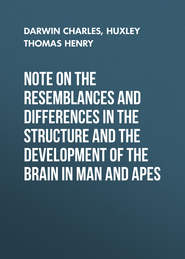По всем вопросам обращайтесь на: info@litportal.ru
(©) 2003-2024.
✖
The Expression of the Emotions in Man and Animals
Настройки чтения
Размер шрифта
Высота строк
Поля
We have seen that in all parts of the world persons who feel shame for some moral delinquency, are apt to avert, bend down, or hide their faces, independently of any thought about their personal appearance. The object can hardly be to conceal their blushes, for the face is thus averted or hidden under circumstances which exclude any desire to conceal shame, as when guilt is fully confessed and repented of. It is, however, probable that primeval man before he had acquired much moral sensitiveness would have been highly sensitive about his personal appearance, at least in reference to the other sex, and he would consequently have felt distress at any depreciatory remarks about his appearance; and this is one form of shame. And as the face is the part of the body which is most regarded, it is intelligible that any one ashamed of his personal appearance would desire to conceal this part of his body. The habit having been thus acquired, would naturally be carried on when shame from strictly moral causes was felt; and it is not easy otherwise to see why under these circumstances there should be a desire to hide the face more than any other part of the body.
The habit, so general with every one who feels ashamed, of turning away, or lowering his eyes, or restlessly moving them from side to side, probably follows from each glance directed towards those present, bringing home the conviction that he is intently regarded; and he endeavours, by not looking at those present, and especially not at their eyes, momentarily to escape from this painful conviction.
Shyness. – This odd state of mind, often called shamefacedness, or false shame, or mauvaise honte, appears to be one of the most efficient of all the causes of blushing. Shyness is, indeed, chiefly recognized by the face reddening, by the eyes being averted or cast down, and by awkward, nervous movements of the body. Many a woman blushes from this cause, a hundred, perhaps a thousand times, to once that she blushes from having done anything deserving blame, and of which she is truly ashamed. Shyness seems to depend on sensitiveness to the opinion, whether good or bad, of others, more especially with respect to external appearance. Strangers neither know nor care anything about our conduct or character, but they may, and often do, criticize our appearance: hence shy persons are particularly apt to be shy and to blush in the presence of strangers. The consciousness of anything peculiar, or even new, in the dress, or any slight blemish on the person, and more especially, on the face – points which are likely to attract the attention of strangers – makes the shy intolerably shy. On the other hand, in those cases in which conduct and not personal appearance is concerned, we are much more apt to be shy in the presence of acquaintances, whose judgment we in some degree value, than in that of strangers. A physician told me that a young man, a wealthy duke, with whom he had travelled as medical attendant, blushed like a girl, when he paid him his fee; yet this young man probably would not have blushed and been shy, had he been paying a bill to a tradesman. Some persons, however, are so sensitive, that the mere act of speaking to almost any one is sufficient to rouse their self-consciousness, and a slight blush is the result.
Disapprobation or ridicule, from our sensitiveness on this head, causes shyness and blushing much more readily than does approbation; though the latter with some persons is highly efficient. The conceited are rarely shy; for they value themselves much too highly to expect depreciation. Why a proud man is often shy, as appears to be the case, is not so obvious, unless it be that, with all his self-reliance, he really thinks much about the opinion of others although in a disdainful spirit. Persons who are exceedingly shy are rarely shy in the presence of those with whom they are quite familiar, and of whose good opinion and sympathy they are perfectly assured; – for instance, a girl in the presence of her mother. I neglected to inquire in my printed paper whether shyness can be detected in the different races of man; but a Hindoo gentleman assured Mr. Erskine that it is recognizable in his countrymen.
Shyness, as the derivation of the word indicates in several languages,[1327] (#linknote_1327) is closely related to fear; yet it is distinct from fear in the ordinary sense. A shy man no doubt dreads the notice of strangers, but can hardly be said to be afraid of them, he may be as bold as a hero in battle, and yet have no self-confidence about trifles in the presence of strangers. Almost every one is extremely nervous when first addressing a public assembly, and most men remain so throughout their lives; but this appears to depend on the consciousness of a great coming exertion, with its associated effects on the system, rather than on shyness;[1328] (#linknote_1328) although a timid or shy man no doubt suffers on such occasions infinitely more than another. With very young children it is difficult to distinguish between fear and shyness; but this latter feeling with them has often seemed to me to partake of the character of the wildness of an untamed animal. Shyness comes on at a very early age. In one of my own children, when two years and three months old, I saw a trace of what certainly appeared to be shyness, directed towards myself after an absence from home of only a week. This was shown not by a blush, but by the eyes being for a few minutes slightly averted from me. I have noticed on other occasions that shyness or shamefacedness and real shame are exhibited in the eyes of young children before they have acquired the power of blushing.
As shyness apparently depends on self-attention, we can perceive how right are those who maintain that reprehending children for shyness, instead of doing them any good, does much harm, as it calls their attention still more closely to themselves. It has been well urged that "nothing hurts young people more than to be watched continually about their feelings, to have their countenances scrutinized, and the degrees of their sensibility measured by the surveying eye of the unmerciful spectator. Under the constraint of such examinations they can think of nothing but that they are looked at, and feel nothing but shame or apprehension."[1329] (#linknote_1329)
Moral causes: guilt. – With respect to blushing from strictly moral causes, we meet with the same fundamental principle as before, namely, regard for the opinion of others. It is not the conscience which raises a blush, for a man may sincerely regret some slight fault committed in solitude, or he may suffer the deepest remorse for an undetected crime, but he will not blush. "I blush," says Dr. Burgess,[1330] (#linknote_1330) "in the presence of my accusers." It is not the sense of guilt, but the thought that others think or know us to be guilty which crimsons the face. A man may feel thoroughly ashamed at having told a small falsehood, without blushing; but if he even suspects that he is detected he will instantly blush, especially if detected by one whom he reveres.
On the other hand, a man may be convinced that God witnesses all his actions, and he may feel deeply conscious of some fault and pray for forgiveness; but this will not, as a lady who is a great blusher believes, ever excite a blush. The explanation of this difference between the knowledge by God and man of our actions lies, I presume, in man's disapprobation of immoral conduct being somewhat akin in nature to his depreciation of our personal appearance, so that through association both lead to similar results; whereas the disapprobation of God brings up no such association.
Many a person has blushed intensely when accused of some crime, though completely innocent of it. Even the thought, as the lady before referred to has observed to me, that others think that we have made an unkind or stupid remark, is amply sufficient to cause a blush, although we know all the time that we have been completely misunderstood. An action may be meritorious or of an indifferent nature, but a sensitive person, if he suspects that others take a different view of it, will blush. For instance, a lady by herself may give money to a beggar without a trace of a blush, but if others are present, and she doubts whether they approve, or suspects that they think her influenced by display, she will blush. So it will be, if she offers to relieve the distress of a decayed gentlewoman, more particularly of one whom she had previously known under better circumstances, as she cannot then feel sure how her conduct will be viewed. But such cases as these blend into shyness.
Breaches of etiquette. – The rules of etiquette always refer to conduct in the presence of, or towards others. They have no necessary connection with the moral sense, and are often meaningless. Nevertheless as they depend on the fixed custom of our equals and superiors, whose opinion we highly regard, they are considered almost as binding as are the laws of honour to a gentleman. Consequently the breach of the laws of etiquette, that is, any impoliteness or gaucherie, any impropriety, or an inappropriate remark, though quite accidental, will cause the most intense blushing of which a man is capable. Even the recollection of such an act, after an interval of many years, will make the whole body to tingle. So strong, also, is the power of sympathy that a sensitive person, as a lady has assured me, will sometimes blush at a flagrant breach of etiquette by a perfect stranger, though the act may in no way concern her.
Modesty. – This is another powerful agent in exciting blushes; but the word modesty includes very different states of the mind. It implies humility, and we often judge of this by persons being greatly pleased and blushing at slight praise, or by being annoyed at praise which seems to them too high according to their own humble standard of themselves. Blushing here has the usual signification of regard for the opinion of others. But modesty frequently relates to acts of indelicacy; and indelicacy is an affair of etiquette, as we clearly see with the nations that go altogether or nearly naked. He who is modest, and blushes easily at acts of this nature, does so because they are breaches of a firmly and wisely established etiquette. This is indeed shown by the derivation of the word modest from modus, a measure or standard of behaviour. A blush due to this form of modesty is, moreover, apt to be intense, because it generally relates to the opposite sex; and we have seen how in all cases our liability to blush is thus increased. We apply the term 'modest,' as it would appear, to those who have an humble opinion of themselves, and to those who are extremely sensitive about an indelicate word or deed, simply because in both cases blushes are readily excited, for these two frames of mind have nothing else in common. Shyness also, from this same cause, is often mistaken for modesty in the sense of humility.
Some persons flush up, as I have observed and have been assured, at any sudden and disagreeable recollection. The commonest cause seems to be the sudden remembrance of not having done something for another person which had been promised. In this case it may be that the thought passes half unconsciously through the mind, "What will he think of me?" and then the flush would partake of the nature of a true blush. But whether such flushes are in most cases due to the capillary circulation being affected, is very doubtful; for we must remember that almost every strong emotion, such as anger or great joy, acts on the heart, and causes the face to redden.
The fact that blushes may be excited in absolute solitude seems opposed to the view here taken, namely that the habit originally arose from thinking about what others think of us. Several ladies, who are great blushers, are unanimous in regard to solitude; and some of them believe that they have blushed in the dark. From what Mr. Forbes has stated with respect to the Aymaras, and from my own sensations, I have no doubt that this latter statement is correct. Shakspeare, therefore, erred when he made Juliet, who was not even by herself, say to Romeo (act ii. sc. 2): —
"Thou know'st the mask of night is on my face;
Else would a maiden blush bepaint my cheek,
For that which thou hast heard me speak to-night."
But when a blush is excited in solitude, the cause almost always relates to the thoughts of others about us – to acts done in their presence, or suspected by them; or again when we reflect what others would have thought of us had they known of the act. Nevertheless one or two of my informants believe that they have blushed from shame at acts in no way relating to others. If this be so, we must attribute the result to the force of inveterate habit and association, under a state of mind closely analogous to that which ordinarily excites a blush; nor need we feel surprise at this, as even sympathy with another person who commits a flagrant breach of etiquette is believed, as we have just seen, sometimes to cause a blush.
Finally, then, I conclude that blushing, – whether due to shyness – to shame for a real crime – to shame from a breach of the laws of etiquette – to modesty from humility – to modesty from an indelicacy – depends in all cases on the same principle; this principle being a sensitive regard for the opinion, more particularly for the depreciation of others, primarily in relation to our personal appearance, especially of our faces; and secondarily, through the force of association and habit, in relation to the opinion of others on our conduct.
Theory of Blushing. – We have now to consider, why should the thought that others are thinking about us affect our capillary circulation? Sir C. Bell insists[1331] (#linknote_1331) that blushing "is a provision for expression, as may be inferred from the colour extending only to the surface of the face, neck, and breast, the parts most exposed. It is not acquired; it is from the beginning." Dr. Burgess believes that it was designed by the Creator in "order that the soul might have sovereign power of displaying in the cheeks the various internal emotions of the moral feelings;" so as to serve as a check on ourselves, and as a sign to others, that we were violating rules which ought to be held sacred. Gratiolet merely remarks, – "Or, comme il est dans l'ordre de la nature que l'etre social le plus intelligent soit aussi le plus intelligible, cette faculte de rougeur et de paleur qui distingue l'homme, est un signe naturel de sa haute perfection."
The belief that blushing was SPECIALLY designed by the Creator is opposed to the general theory of evolution, which is now so largely accepted; but it forms no part of my duty here to argue on the general question. Those who believe in design, will find it difficult to account for shyness being the most frequent and efficient of all the causes of blushing, as it makes the blusher to suffer and the beholder uncomfortable, without being of the least service to either of them. They will also find it difficult to account for negroes and other dark-coloured races blushing, in whom a change of colour in the skin is scarcely or not at all visible.
No doubt a slight blush adds to the beauty of a maiden's face; and the Circassian women who are capable of blushing, invariably fetch a higher price in the seraolio of the Sultan than less susceptible women.[1332] (#linknote_1332) But the firmest believer in the efficacy of sexual selection will hardly suppose that blushing was acquired as a sexual ornament. This view would also be opposed to what has just been said about the dark-coloured races blushing in an invisible manner.
The hypothesis which appears to me the most probable, though it may at first seem rash, is that attention closely directed to any part of the body tends to interfere with the ordinary and tonic contraction of the small arteries of that part. These vessels, in consequence, become at such times more or less relaxed, and are instantly filled with arterial blood. This tendency will have been much strengthened, if frequent attention has been paid during many generations to the same part, owing to nerve-force readily flowing along accustomed channels, and by the power of inheritance. Whenever we believe that others are depreciating or even considering our personal appearance, our attention is vividly directed to the outer and visible parts of our bodies; and of all such parts we are most sensitive about our faces, as no doubt has been the case during many past generations. Therefore, assuming for the moment that the capillary vessels can be acted on by close attention, those of the face will have become eminently susceptible. Through the force of association, the same effects will tend to follow whenever we think that others are considering or censuring our actions or character.
As the basis of this theory rests on mental attention having some power to influence the capillary circulation, it will be necessary to give a considerable body of details, bearing more or less directly on this subject. Several observers,[1333] (#linknote_1333) who from their wide experience and knowledge are eminently capable of forming a sound judgment, are convinced that attention or consciousness (which latter term Sir H. Holland thinks the more explicit) concentrated on almost any part of the body produces some direct physical effect on it. This applies to the movements of the involuntary muscles, and of the voluntary muscles when acting involuntarily, – to the secretion of the glands, – to the activity of the senses and sensations, – and even to the nutrition of parts.
It is known that the involuntary movements of the heart are affected if close attention be paid to them. Gratiolet[1334] (#linknote_1334) gives the case of a man, who by continually watching and counting his own pulse, at last caused one beat out of every six to intermit. On the other hand, my father told me of a careful observer, who certainly had heart-disease and died from it, and who positively stated that his pulse was habitually irregular to an extreme degree; yet to his great disappointment it invariably became regular as soon as my father entered the room. Sir H. Holland remarks, that "the effect upon the circulation of a part from the consciousness suddenly directed and fixed upon it, is often obvious and immediate." Professor Laycock, who has particularly attended to phenomena of this nature, insists that "when the attention is directed to any portion of the body, innervation and circulation are excited locally, and the functional activity of that portion developed."
It is generally believed that the peristaltic movements of the intestines are influenced by attention being paid to them at fixed recurrent periods; and these movements depend on the contraction of unstriped and involuntary muscles. The abnormal action of the voluntary muscles in epilepsy, chorea, and hysteria is known to be influenced by the expectation of an attack, and by the sight of other patients similarly affected. So it is with the involuntary acts of yawning and laughing.
Certain glands are much influenced by thinking of them, or of the conditions under which they have been habitually excited. This is familiar to every one in the increased flow of saliva, when the thought, for instance, of intensely acid fruit is kept before the mind. It was shown in our sixth chapter, that an earnest and long-continued desire either to repress, or to increase, the action of the lacrymal glands is effectual. Some curious cases have been recorded in the case of women, of the power of the mind on the mammary glands; and still more remarkable ones in relation to the uterine functions.
See Gratiolet on this subject, De la Phys. p. 287. Dr. J. Crichton Browne, from his observations on the insane, is convinced that attention directed for a prolonged period on any part or organ may ultimately influence its capillary circulation and nutrition. He has given me some extraordinary cases; one of these, which cannot here be related in full, refers to a married woman fifty years of age, who laboured under the firm and long-continued delusion that she was pregnant. When the expected period arrived, she acted precisely as if she had been really delivered of a child, and seemed to suffer extreme pain, so that the perspiration broke out on her forehead. The result was that a state of things returned, continuing for three days, which had ceased during the six previous years. Mr. Braid gives, in his 'Magic, Hypnotism,' &c., 1852, p. 95, and in his other works analogous cases, as well as other facts showing the great influence of the will on the mammary glands, even on one breast alone.
When we direct our whole attention to any one sense, its acuteness is increased;[1340] (#linknote_1340) and the continued habit of close attention, as with blind people to that of hearing, and with the blind and deaf to that of touch, appears to improve the sense in question permanently. There is, also, some reason to believe, judging from the capacities of different races of man, that the effects are inherited. Turning to ordinary sensations, it is well known that pain is increased by attending to it; and Sir B. Brodie goes so far as to believe that pain may be felt in any part of the body to which attention is closely drawn.[1341] (#linknote_1341) Sir H. Holland also remarks that we become not only conscious of the existence of a part subjected to concentrated attention, but we experience in it various odd sensations as of weight, heat, cold, tingling, or itching.[1342] (#linknote_1342)
Lastly, some physiologists maintain that the mind can influence the nutrition of parts. Sir J. Paget has given a curious instance of the power, not indeed of the mind, but of the nervous system, on the hair. A lady "who is subject to attacks of what is called nervous headache, always finds in the morning after such an one, that some patches of her hair are white, as if powdered with starch. The change is effected in a night, and in a few days after, the hairs gradually regain their dark brownish colour."[1343] (#linknote_1343)
We thus see that close attention certainly affects various parts and organs, which are not properly under the control of the will. By what means attention – perhaps the most wonderful of all the wondrous powers of the mind – is effected, is an extremely obscure subject. According to Muller,[1344] (#linknote_1344) the process by which the sensory cells of the brain are rendered, through the will, susceptible of receiving more intense and distinct impressions, is closely analogous to that by which the motor cells are excited to send nerve-force to the voluntary muscles. There are many points of analogy in the action of the sensory and motor nerve-cells; for instance, the familiar fact that close attention to any one sense causes fatigue, like the prolonged exertion of any one muscle.[1345] (#linknote_1345) When therefore we voluntarily concentrate our attention on any part of the body, the cells of the brain which receive impressions or sensations from that part are, it is probable, in some unknown manner stimulated into activity. This may account, without any local change in the part to which our attention is earnestly directed, for pain or odd sensations being there felt or increased.
If, however, the part is furnished with muscles, we cannot feel sure, as Mr. Michael Foster has remarked to me, that some slight impulse may not be unconsciously sent to such muscles; and this would probably cause an obscure sensation in the part.
In a large number of cases, as with the salivary and lacrymal glands, intestinal canal, &c., the power of attention seems to rest, either chiefly, or as some physiologists think, exclusively, on the vaso-motor system being affected in such a manner that more blood is allowed to flow into the capillaries of the part in question. This increased action of the capillaries may in some cases be combined with the simultaneously increased activity of the sensorium.
The manner in which the mind affects the vasomotor system may be conceived in the following manner. When we actually taste sour fruit, an impression is sent through the gustatory nerves to a certain part of the sensorium; this transmits nerve-force to the vasomotor centre, which consequently allows the muscular coats of the small arteries that permeate the salivary glands to relax. Hence more blood flows into these glands, and they secrete a copious supply of saliva. Now it does not seem an improbable assumption, that, when we reflect intently on a sensation, the same part of the sensorium, or a closely connected part of it, is brought into a state of activity, in the same manner as when we actually perceive the sensation. If so, the same cells in the brain will be excited, though, perhaps, in a less degree, by vividly thinking about a sour taste, as by perceiving it; and they will transmit in the one case, as in the other, nerve-force to the vaso-motor centre with the same results.
To give another, and, in some respects, more appropriate illustration. If a man stands before a hot fire, his face reddens. This appears to be due, as Mr. Michael Foster informs me, in part to the local action of the heat, and in part to a reflex action from the vaso-motor centres.[1346] (#linknote_1346) In this latter case, the heat affects the nerves of the face; these transmit an impression to the sensory cells of the brain, which act on the vaso-motor centre, and this reacts on the small arteries of the face, relaxing them and allowing them to become filled with blood. Here, again, it seems not improbable that if we were repeatedly to concentrate with great earnestness our attention on the recollection of our heated faces, the same part of the sensorium which gives us the consciousness of actual heat would be in some slight degree stimulated, and would in consequence tend to transmit some nerve-force to the vaso-motor centres, so as to relax the capillaries of the face. Now as men during endless generations have had their attention often and earnestly directed to their personal appearance, and especially to their faces, any incipient tendency in the facial capillaries to be thus affected will have become in the course of time greatly strengthened through the principles just referred to, namely, nerve-force passing readily along accustomed channels, and inherited habit. Thus, as it appears to me, a plausible explanation is afforded of the leading phenomena connected with the act of blushing.
Recapitulation. – Men and women, and especially the young, have always valued, in a high degree, their personal appearance; and have likewise regarded the appearance of others. The face has been the chief object of attention, though, when man aboriginally went naked, the whole surface of his body would have been attended to. Our self-attention is excited almost exclusively by the opinion of others, for no person living in absolute solitude would care about his appearance. Every one feels blame more acutely than praise. Now, whenever we know, or suppose, that others are depreciating our personal appearance, our attention is strongly drawn towards ourselves, more especially to our faces. The probable effect of this will be, as has just been explained, to excite into activity that part of the sensorium, which receives the sensory nerves of the face; and this will react through the vaso-motor system on the facial capillaries. By frequent reiteration during numberless generations, the process will have become so habitual, in association with the belief that others are thinking of us, that even a suspicion of their depreciation suffices to relax the capillaries, without any conscious thought about our faces. With some sensitive persons it is enough even to notice their dress to produce the same effect. Through the force, also, of association and inheritance our capillaries are relaxed, whenever we know, or imagine, that any one is blaming, though in silence, our actions, thoughts, or character; and, again, when we are highly praised.
On this hypothesis we can understand how it is that the face blushes much more than any other part of the body, though the whole surface is somewhat affected, more especially with the races which still go nearly naked. It is not at all surprising that the dark-coloured races should blush, though no change of colour is visible in their skins. From the principle of inheritance it is not surprising that persons born blind should blush. We can understand why the young are much more affected than the old, and women more than men; and why the opposite sexes especially excite each other's blushes. It becomes obvious why personal remarks should be particularly liable to cause blushing, and why the most powerful of all the causes is shyness; for shyness relates to the presence and opinion of others, and the shy are always more or less self-conscious. With respect to real shame from moral delinquencies, we can perceive why it is not guilt, but the thought that others think us guilty, which raises a blush. A man reflecting on a crime committed in solitude, and stung by his conscience, does not blush; yet he will blush under the vivid recollection of a detected fault, or of one committed in the presence of others, the degree of blushing being closely related to the feeling of regard for those who have detected, witnessed, or suspected his fault. Breaches of conventional rules of conduct, if they are rigidly insisted on by our equals or superiors, often cause more intense blushes even than a detected crime, and an act which is really criminal, if not blamed by our equals, hardly raises a tinge of colour on our cheeks. Modesty from humility, or from an indelicacy, excites a vivid blush, as both relate to the judgment or fixed customs of others.
From the intimate sympathy which exists between the capillary circulation of the surface of the head and of the brain, whenever there is intense blushing, there will be some, and often great, confusion of mind. This is frequently accompanied by awkward movements, and sometimes by the involuntary twitching of certain muscles.
As blushing, according to this hypothesis, is an indirect result of attention, originally directed to our personal appearance, that is to the surface of the body, and more especially to the face, we can understand the meaning of the gestures which accompany blushing throughout the world. These consist in hiding the face, or turning it towards the ground, or to one side. The eyes are generally averted or are restless, for to look at the man who causes us to feel shame or shyness, immediately brings home in an intolerable manner the consciousness that his gaze is directed on us. Through the principle of associated habit, the same movements of the face and eyes are practised, and can, indeed, hardly be avoided, whenever we know or believe that, others are blaming, or too strongly praising, our moral conduct.
CHAPTER XIV. – CONCLUDING REMARKS AND SUMMARY
The three leading principles which have determined the chief movements of expression – Their inheritance – On the part which the will and intention have played in the acquirement of various expressions – The instinctive recognition of expression – The bearing of our subject on the specific unity of the races of man – On the successive acquirement of various expressions by the progenitors of man – The importance of expression – Conclusion.
I HAVE now described, to the best of my ability, the chief expressive actions in man, and in some few of the lower animals. I have also attempted to explain the origin or development of these actions through the three principles given in the first chapter. The first of these principles is, that movements which are serviceable in gratifying some desire, or in relieving some sensation, if often repeated, become so habitual that they are performed, whether or not of any service, whenever the same desire or sensation is felt, even in a very weak degree.
Our second principle is that of antithesis. The habit of voluntarily performing opposite movements under opposite impulses has become firmly established in us by the practice of our whole lives. Hence, if certain actions have been regularly performed, in accordance with our first principle, under a certain frame of mind, there will be a strong and involuntary tendency to the performance of directly opposite actions, whether or not these are of any use, under the excitement of an opposite frame of mind.
Our third principle is the direct action of the excited nervous system on the body, independently of the will, and independently, in large part, of habit. Experience shows that nerve-force is generated and set free whenever the cerebro-spinal system is excited. The direction which this nerve-force follows is necessarily determined by the lines of connection between the nerve-cells, with each other and with various parts of the body. But the direction is likewise much influenced by habit; inasmuch as nerve-force passes readily along accustomed channels.
The frantic and senseless actions of an enraged man may be attributed in part to the undirected flow of nerve-force, and in part to the effects of habit, for these actions often vaguely represent the act of striking. They thus pass into gestures included under our first principle; as when an indignant man unconsciously throws himself into a fitting attitude for attacking his opponent, though without any intention of making an actual attack. We see also the influence of habit in all the emotions and sensations which are called exciting; for they have assumed this character from having habitually led to energetic action; and action affects, in an indirect manner, the respiratory and circulatory system; and the latter reacts on the brain. Whenever these emotions or sensations are even slightly felt by us, though they may not at the time lead to any exertion, our whole system is nevertheless disturbed through the force of habit and association. Other emotions and sensations are called depressing, because they have not habitually led to energetic action, excepting just at first, as in the case of extreme pain, fear, and grief, and they have ultimately caused complete exhaustion; they are consequently expressed chiefly by negative signs and by prostration. Again, there are other emotions, such as that of affection, which do not commonly lead to action of any kind, and consequently are not exhibited by any strongly marked outward signs. Affection indeed, in as far as it is a pleasurable sensation, excites the ordinary signs of pleasure.
On the other hand, many of the effects due to the excitement of the nervous system seem to be quite independent of the flow of nerve-force along the channels which have been rendered habitual by former exertions of the will. Such effects, which often reveal the state of mind of the person thus affected, cannot at present be explained; for instance, the change of colour in the hair from extreme terror or grief, – the cold sweat and the trembling of the muscles from fear, – the modified secretions of the intestinal canal, – and the failure of certain glands to act.
Notwithstanding that much remains unintelligible in our present subject, so many expressive movements and actions can be explained to a certain extent through the above three principles, that we may hope hereafter to see all explained by these or by closely analogous principles.
Actions of all kinds, if regularly accompanying any state of the mind, are at once recognized as expressive. These may consist of movements of any part of the body, as the wagging of a dog's tail, the shrugging of a man's shoulders, the erection of the hair, the exudation of perspiration, the state of the capillary circulation, laboured breathing, and the use of the vocal or other sound-producing instruments. Even insects express anger, terror, jealousy, and love by their stridulation. With man the respiratory organs are of especial importance in expression, not only in a direct, but in a still higher degree in an indirect manner.
Few points are more interesting in our present subject than the extraordinarily complex chain of events which lead to certain expressive movements. Take, for instance, the oblique eyebrows of a man suffering from grief or anxiety. When infants scream loudly from hunger or pain, the circulation is affected, and the eyes tend to become gorged with blood: consequently the muscles surrounding the eyes are strongly contracted as a protection: this action, in the course of many generations, has become firmly fixed and inherited: but when, with advancing years and culture, the habit of screaming is partially repressed, the muscles round the eyes still tend to contract, whenever even slight distress is felt: of these muscles, the pyramidals of the nose are less under the control of the will than are the others and their contraction can be checked only by that of the central fasciae of the frontal muscle: these latter fasciae draw up the inner ends of the eyebrows, and wrinkle the forehead in a peculiar manner, which we instantly recognize as the expression of grief or anxiety. Slight movements, such as these just described, or the scarcely perceptible drawing down of the corners of the mouth, are the last remnants or rudiments of strongly marked and intelligible movements. They are as full of significance to us in regard to expression, as are ordinary rudiments to the naturalist in the classification and genealogy of organic beings.
That the chief expressive actions, exhibited by man and by the lower animals, are now innate or inherited, – that is, have not been learnt by the individual, – is admitted by every one. So little has learning or imitation to do with several of them that they are from the earliest days and throughout life quite beyond our control; for instance, the relaxation of the arteries of the skin in blushing, and the increased action of the heart in anger. We may see children, only two or three years old, and even those born blind, blushing from shame; and the naked scalp of a very young infant reddens from passion. Infants scream from pain directly after birth, and all their features then assume the same form as during subsequent years. These facts alone suffice to show that many of our most important expressions have not been learnt; but it is remarkable that some, which are certainly innate, require practice in the individual, before they are performed in a full and perfect manner; for instance, weeping and laughing. The inheritance of most of our expressive actions explains the fact that those born blind display them, as I hear from the Rev. R. H. Blair, equally well with those gifted with eyesight. We can thus also understand the fact that the young and the old of widely different races, both with man and animals, express the same state of mind by the same movements.
We are so familiar with the fact of young and old animals displaying their feelings in the same manner, that we hardly perceive how remarkable it is that a young puppy should wag its tail when pleased, depress its ears and uncover its canine teeth when pretending to be savage, just like an old dog; or that a kitten should arch its little back and erect its hair when frightened and angry, like an old cat. When, however, we turn to less common gestures in ourselves, which we are accustomed to look at as artificial or conventional, – such as shrugging the shoulders, as a sign of impotence, or the raising the arms with open hands and extended fingers, as a sign of wonder, – we feel perhaps too much surprise at finding that they are innate. That these and some other gestures are inherited, we may infer from their being performed by very young children, by those born blind, and by the most widely distinct races of man. We should also bear in mind that new and highly peculiar tricks, in association with certain states of the mind, are known to have arisen in certain individuals, and to have been afterwards transmitted to their offspring, in some cases, for more than one generation.
Certain other gestures, which seem to us so natural that we might easily imagine that they were innate, apparently have been learnt like the words of a language. This seems to be the case with the joining of the uplifted hands, and the turning up of the eyes, in prayer. So it is with kissing as a mark of affection; but this is innate, in so far as it depends on the pleasure derived from contact with a beloved person. The evidence with respect to the inheritance of nodding and shaking the head, as signs of affirmation and negation, is doubtful; for they are not universal, yet seem too general to have been independently acquired by all the individuals of so many races.
















